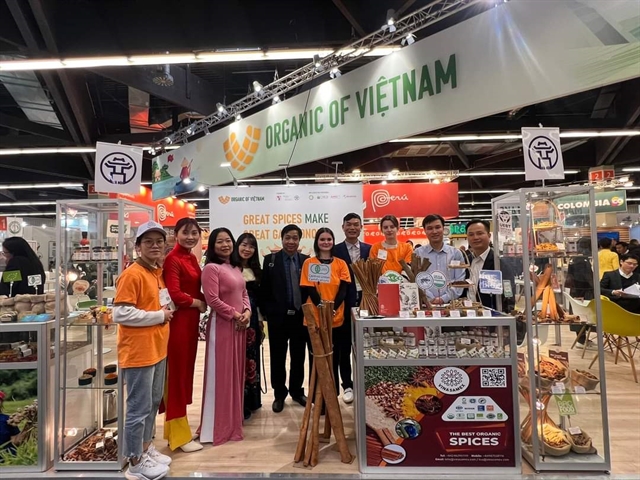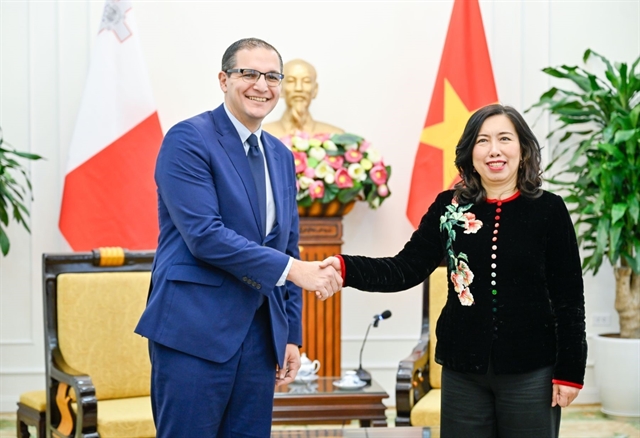 Society
Society

 |
| Organic nut products are introduced at Germany's Nürnberg Fair in 2023. Photos courtesy of the Hà Nội Department of Agriculture and Rural Development |
HÀ NỘI – The agriculture industry of Hà Nội has moved towards a green, safe and environmentally friendly agricultural policy.
In recent years, many localities of the capital city have developed organic agricultural production to catch up with the demands of consumers and bring higher economic output to farmers.
The sector has put many new speciality crops and livestock into production. Many farmers in the districts of Phú Xuyên, Ứng Hoà and Mỹ Đức have raised Đông Tảo chickens organically on a large scale.
This is not a native chicken breed of Hà Nội but has been successfully bred by poultry hatcheries in Phú Xuyên District and some other localities.
Nguyễn Văn Thơi, a farmer in Lê Thanh Commune of Mỹ Đức District whose farm has more than 100 chickens, said that the price of the breed has the advantages of quicker growth and softer, more delicious meat.
Đông Tảo chickens are sold at better prices and are preferred by consumers, said Thơi.
Nguyễn Thị Khởi, the owner of a hatchery in Phú Yên Commune of Phú Xuyên District, said that breeds of local specialities such as the Vân Đình duck and Đông Tảo chicken are now frequently chosen by farmers, especially small-scale ones.
The breed is superior to the traditional ones and organic husbandry has created many specialities of agricultural products, meeting the demands of a new middle-class market.
This new trend of organic produce isn't limited to livestock, either. Fruit cultivation is also being influenced by evolving trends.
There are different pomelo varieties for each locality such as Thồ pomelo from Phú Xuyên District, and the Đông Cao pomelo of Mê Linh District with its beautiful red skin which is harvested on the occasion of Tết (Lunar New Year).
Nguyễn Thế Lâm, director of Khánh Phong Agriculture Service Co-operative in Tiến Thịnh Commune of Mê Linh District, said that since 2015 his co-operative has shifted to planting fruit trees with organic methods.
Thanks to strict control of the use of organic fertilizers, the co-operative's fruit quality is dramatically improved and easily consumed in modern distribution channels, said Lâm.
The fruit planting brings an income of VNĐ600-700 million (US$26,000-30,000) per ha per year, he said.
 |
| A booth presented Hà Nội's organic agriculture products at Germany's Nürnberg Fair in 2023. |
Vũ Thị Hương, director of the Hà Nội Agriculture Extention Centre, said that Hà Nội organic agriculture is developing alongside technology application in large-scale production, and preserving and developing indigenous varieties as specialities in the process.
The practice has proven that agricultural production at a household level is much more effective if it is associated with organic methods and the cultivation of speciality varieties, Hương said.
The models of agricultural extension in this direction have had a great impact and are being replicated in many localities, she said.
To encourage farmers to apply organic farming methods, the Hà Nội agriculture sector has provided programmes in science and technology support, and loans through the Hà Nội Agricultural Extension Fund.
“Agricultural products produced according to organic standards have an economic value of 10-20 per cent higher than those produced by conventional methods,” Hương said.
“Moreover, organic agricultural products are trusted by domestic and foreign consumers and have been distributed into modern sales channels such as supermarkets and stores in Hà Nội, and a large number of products are even exported,” she said.
Organic agricultural production is a long process, requiring many rigorous stages, from the soil, water and air environment to the care of people handling the products. But the quality of the final product is much higher.
Therefore, the centre will continue to support localities to build and expand the VietGAP agricultural extension model in the direction of organic production methods. This will act as a premise for the development of standards for high-quality organic agriculture after three or five years.
The centre also continues to coordinate with localities to launch courses training farmers to follow strict production methods, and effectively monitor production so as to get organic certificates.
Tạ Văn Tường, vice director of the Hà Nội Agriculture and Rural Development Department, said that relevant agencies need to implement policies and provide capital to support farmers so they can invest in technologically advanced production systems like automatic watering, sensors and state of the art greenhouses.
The city also needs to plan organic farming areas, then evaluate the results of production there and replicate them to move towards building more brands of organic agricultural products, Tường said.
According to Nguyễn Mạnh Quyền, vice chairman of the municipal People’s Committee, Hà Nội has set a target that organic cultivation areas account for 1.5 to 2 per cent of the total cultivation area and organic husbandry products reach 1 to 2 per cent of total production by the year 2025.
To create a new, effective and sustainable transition to organic agriculture, the city is coordinating with functional units to build gene banks to preserve precious plant and animal varieties, Tường said.
The special varieties will not be only preserved but also bred and upgraded to be put into mass production, he said.
This is considered an ideal way to improve the value of specialty plants and animals as well as help solve the problem of agricultural development in the household farms. VNS

.jpg)


